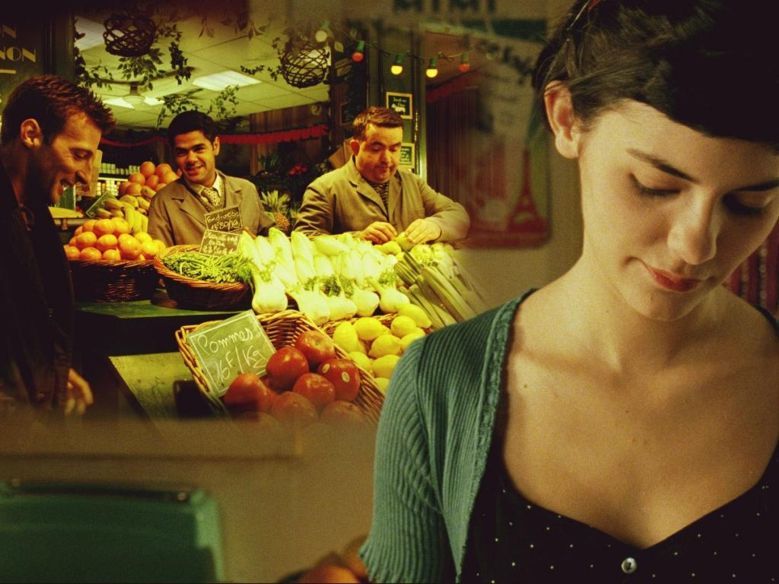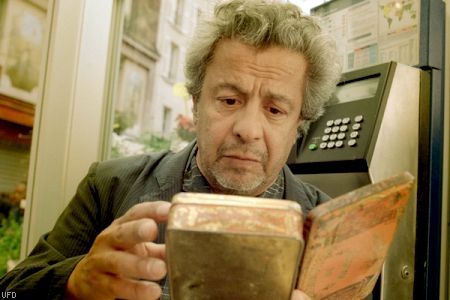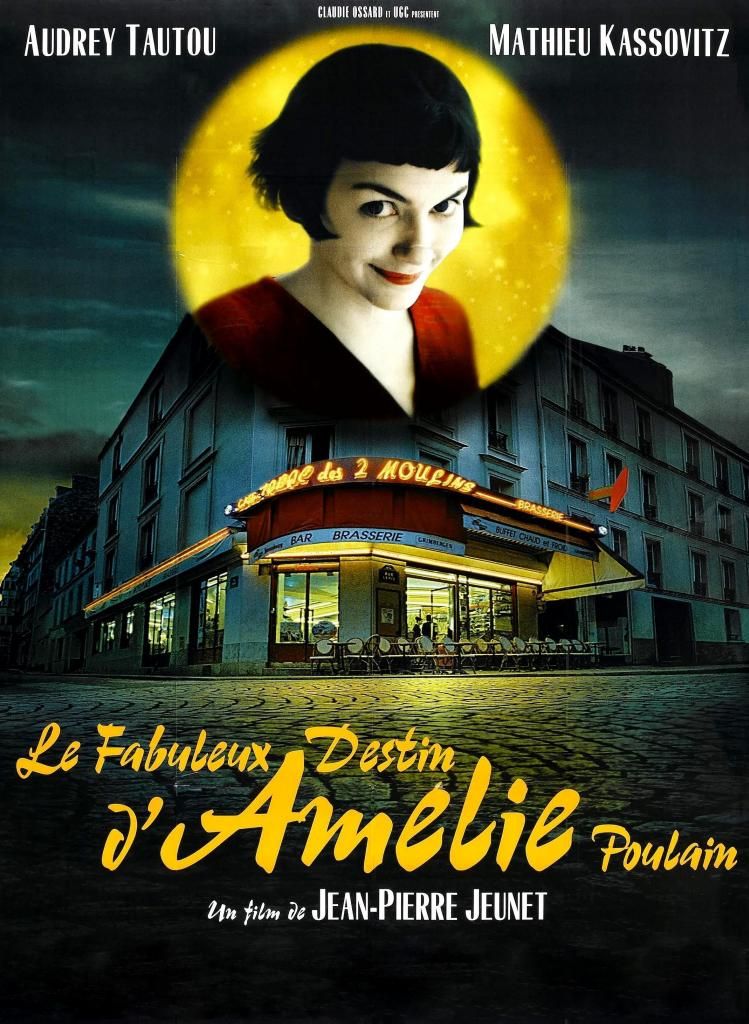Amélie
2001
Director: Jean-Paul Jeunet
Starring: Audrey Tatou, Mathieu
Kassovitz
Every
now and then, a foreign language film comes around that manages to break down
language barriers and win the love of the rather xenophobic American public at
large. Amélie is one such film,
a movie entertaining enough to get the average American viewer to forget that
they have to “read” the movie. Thank
goodness movies like Amélie exist; we need more infusions
of a larger cultural awareness, even if that cultural awareness is a Paris
fairy tale.
Amélie
(Tatou, in her star-making turn) is a shy loner. She grew up as an only child and now lives
alone in Montmartre working as a waitress at a cheerful bar. When she finds a rusty tin box hidden in her
apartment, full of trinkets and toys from the 1950s, she becomes obsessed with
finding the original owner to return to him his treasure trove. The success of this prompts her to continue
work as a do-gooder, but for Amélie, it isn’t just about helping others, she
has to make a convoluted maze of it as well.
When she meets fellow oddball loner Nino (Kassovitz) and falls in love,
she must face her inner fear and slowly open herself up to allowing others in
her life.
The
two strongest points of this film, and those that I believe are responsible for
the film’s international success, are Jeunet’s inventive stylization, and
Tatou’s sweet portrayal of Amélie. I
know I’ve said this before, but I do love a heavily stylized film. Realism absolutely has its place in film, and
I love plenty of realistic films, but I am predisposed to liking a film if it
unabashedly throws reality out the window and lets me lives in a bit of a
fantasy land. Amélie is certainly that
film; from its very opening all the way through to the credits, this is a movie
based nowhere near reality. Like most
films with a unique storytelling technique, the film starts with an inundation
of this, my favorite part of the opening being the “likes” and “dislikes” of
the characters as we learn Amélie’s childhood history. Colors fly in and out of the shot, actions
are sped up then slowed down, there is occasional animation that catches you by
surprise, and there is no shortage of the quick zoom. The sets contribute heavily to create the
very particular world. The movie is set
in 1997, but the sets look straight out of the forties or fifties. There is older furniture, peeling wallpaper,
and lots of curtains. Jeunet frames many
of his shots through doorways or windows which lends the film a bit of a
labyrinthine feeling. This underscores Amélie’s
obsession with “stratagems,” as she calls them, or mazes, as I call them.
Fundamentally, this is a movie that needs to be seen; it takes all the interesting style ideas that Jeunet
experimented with in Delicatessen (1991) and heightens
them, providing you a very unique viewing experience.
 |
| What an interesting, fun little shot! |
Tatou,
for her part, is every bit the doe-eyed sweet, scared loner idealist that the
part of Amélie demands. She is like some
frail, delicate flower that is capable of laughing at you behind your
back. Every sweet adjective you can
think of applies to Tatou here, and she makes nearly everyone who watches her,
fall in love with her. Tatou has
precious few lines; most of her performance is through her wide eyes and
expressive face; it’s almost a pantomime.
When she does speak, she does a nice job varying her tone. She is alternately high and impish,
whispering and secretive, or low and guttural.
And
yet.
Here’s
the thing: I like Amélie. But I don’t love
Amélie. And, as insane as that sounds, I fear the
wrath of my fellow movie fans for not being a rabid fan of this film.
I
want to say this loud and clear right now: I do really like this movie. It’s fun and it’s entertaining, for the
reasons that I said above. So please,
don’t let my next paragraph make you hate me.
 |
| This scene. I wanted more of this, and I didn't get it. |
Ultimately,
the reason that I am not over-the-moon about this movie is that I feel it’s too
sweet without a strong enough emotional core.
All of Jeunet’s awesome stylization, all of Tatou’s adoringly naïve
performance, would be better served if the film had more of a heart. It leaves me feeling a bit hollow at the end,
quite frankly, and the film is just a tad too long. It’s like having too much cotton candy to eat
at the fair. Sure, cotton candy’s
awesome and pretty and sweet, but as soon as it touches your tongue, it
dissolves and fades away, leaving you empty on the inside. See, Amélie starts out with good ideas:
anonymously helping others, making their lives happier. To me, the emotional summit of the film
occurs the first time Amélie does this.
I love the sequence of Amélie returning the tin box full of little
toys. It’s so beautifully poignant, it
brings a tear to my eye. From there,
though, none of Amélie’s other acts of kindness quite reach the same
level. Walking a blind man across the
road while describing everything in lurid detail is too manic to be emotionally
fulfilling. Helping two lost souls fall
in love implodes in on itself and is played for raunchy laughs rather than
emotional punch. Delivering a long lost
love letter is nice, but the recipient was played too odd. And for all of Amélie’s kindness, she is also
a little bit wicked. We laugh at how she
exacts her odd revenge on an unkind market owner, but is this doing anything to
make me more emotionally connected to her or the film? No, it isn’t.
I want more of that initial resonance, and it never comes. Even Amélie’s own love affair, though very
sweet, is too tedious in its peekaboo courtship for me to really root for the
pair. Honestly, by the end of the movie,
I almost want to slap Amélie just a wee little bit and tell her to stop being
so damned contrived with everything she does.
She takes timid to an incredibly frustrating level.
Amélie is a very fun, entertaining
film, and I love that it was able to find an enthusiastic audience in
America. That’s so important. But I don’t love it for itself. I like it, it’s fun to watch on occasion, but
by the end of the movie, it really starts to give me cavities. It has the promise of a legitimate emotional
connection, but it falls short.
Arbitrary
Rating: 8.5/10

I love this movie a lot. I saw it after it showed up on the 2001 year end IMDB Top 250 list. To this day it still remains one of the very best finds I have had from watching movies off a list. Audrey Tautou is perfect in the role and Amelie is one of my favorite characters of all time.
ReplyDeleteI don't have a problem with people disliking this movie, if I can understand their reason. Usually they say it's that the film is "too silly" or "too frivolous" - usually in a "how dare they have fun in a movie" kind of tone.
I do have to say that I can't comprehend what you were trying to communicate in your next to last paragraph. You say that the movie is lacking heart, or more precisely that it needs more heart. That statement leaves me flabbergasted. I'd be hard pressed to name any other movie that has more heart to it. Do you have some examples of other films you feel have more heart? That might help me to understand better.
But I DON'T dislike this movie, which is so desperately want to say. I just don't love it. Maybe I need to say it again more loudly - I LIKE THIS MOVIE. I AM NOT HATING ON THIS MOVIE. IT'S A GOOD MOVIE. I LIKE IT, I'D RECOMMEND IT.
DeleteBut but but... it feels a touch SHALLOW. It's like Jeunet is tap dancing around the idea of forming a real emotional connection with me, but he never actually takes me there. Just like his Delicatessen, I feel more I should be rooting for Amelie because he TELLS me I should be rooting for her, than because he's actually CONVINCED me to root for her. He hit a ground rules double, but he didn't knock it out of the park. By the end of the film, it's just too twee for me, too self aware, and that's when the "big emotional event" happens; see, for me, again, that emotional climax was the first time Amelie helped someone. That was awesome. That was a real connection for me. Jeunet NEVER takes me to the same place again through the rest of the film. He gets sidetracked, somehow, by all his fun little characters and can't get that same resonance back. Amelie, as a character, I guess I just don't connect with in the same way so many others do. All his awesome stylization almost builds a wall between me and the character, ultimately serving more to distract than to woo.
It's a nice love story. But it's so not my favorite.
I have to think about films that have "heart." I'll get back to you on that.
I knew, I KNEW as soon as this was announced for "Movie of the Week" that I would get flak for not rating it a 10 out of 10. I effin' knew, man.
I wasn't trying to give you flak. My apologies if that is how my request for help in understanding came across. Perhaps it is a gender thing. I am sometimes baffled by the male characters that female reviewers say they were emotionally invested in. Perhaps you are experiencing a similar kind of disconnect.
DeleteAs a man Amelie is an extremely appealing woman, not just for her cuteness, but for who she is as a person. I was completely emotionally invested in her and the movie. As I said at the end of my review, I have never literally fallen in love with a movie character, but if there was ever one I wanted to hold in my arms and reassure that she would find love and happiness it's Amelie Poulain.
I can't think of a movie with more heart. That's why I thought if I could get some examples of ones you feel have more heart I could see a pattern and from that gain an understanding on how "heart" means something slightly different to you from what it means to me.
See, the type of woman I find myself attracted to is not Amelie's type at all. All my girl-crushes are on the kicking ass and taking names type of woman. Ziva David is perhaps one of my biggest girl-crushes; I love her to death, I'd totally go gay for Ziva David. Ziva David is worlds apart from Amelie. I love Joan from I Know Where I'm Going because she's so dang take-charge.
DeleteI can empirically understand the appeal of wanting to comfort Amelie and protect her. I can understand that this probably triggers some sort of machismo impulse. Personally, I've never really wanted to be protected, and I think such women are, well, kinda wimpy. Maybe my lack of connection with Amelie stems from this. Maybe I just think Amelie needs to grow much more of a backbone and much sooner than she actually does. Maybe I just get way too frustrated with her from a vaguely feminist standpoint. I can empirically understand why one would want to comfort Amelie, but I myself do not want to.
I need to go through my DVD list to think of more films with heart, but Gilmore Girls just oozes sassy heart as a TV series (I know it's not what you asked for, but I figured it counts). Ordinary People aches with painful heart. Princess Bride. Ang Lee's stuff, like Sense and Sensibility and Brokeback Mountain. Strictly Ballroom. Best of Youth, actually. Beautiful Girls is LOADED with boy-style heart. Lost in Translation. While You Were Sleeping.
Sorry, thinking of more. Sideways - TOTALLY. To a lesser extent, Payne's The Descendants and About Schmidt. City Lights. The Artist. Brief Encounter. A Midwinter's Tale, aka In the Bleak Midwinter (this tiny little movie no one's ever heard of - maybe you have???). To a lesser extent, Peter's Friends.
DeleteI've seen all of those examples, except for A Midwinter's Tale and Gilmore Girls. By my definition of "heart" the only ones from that list that would even occur to me to equate to that word are The Princess Bride and The Artist. This has helped me to better understand your meaning of heart, though. Thanks.
DeleteZiva David is the token female agent from NCIS, right? I've seen maybe 10 episodes in syndication. I didn't like the show, not because of her, but because the Mark Harmon character is a dick, pardon my French. I'd work for him for a very short time before deciding I didn't want to put up with him anymore. I realize I'm in the minority, though, and that it is a very popular show.
I'm with Chip on this--I think it's loaded with heart. For me, the entire point of the film is Amelie's desire to make other people happy and her inability to make herself happy. Her entire fantasy life is created strictly so that she doesn't have to deal with a reality that might depress her or make her feel inadequate. Her fantasy world is safe--going out of that, attempting a real relationship is dangerous. The entire point of the film is her decision to take that risk at the end. That's the emotional heart.
ReplyDelete"The entire point of the film is her decision to take that risk at the end. That's the emotional heart."
DeleteSee, I don't disagree. Jeunet just couldn't make me actually FEEL it. He SHOWED it to me, but he couldn't make me FEEL it. I totally understand what Jeunet was trying to say. I just feel like a student who memorizes something instead of actually UNDERSTANDING the underlying concepts. He couldn't go deeper than the superficial for me.
I get where you're coming from. I just bought it completely.
DeleteI quite follow both Chip and Steve. I too fell completely for Amelie when I saw the movie in the cinema and I agree that the story is basically about Amelie finding her way out of the fantasy world she lives in. It is convoluted, surreal, amusing and sweet because that is the armor she uses. Breaking that armor is heartbreaking.
ReplyDeleteIn anycase some years ago my wife and I visited the café in which the film takes place and that was a complete downer. The neighborhood is derelict to say the least and the café is scummy and seems to live only on it being a famous film location. Not at all like in the film.
For me, I would have rather Amelie find an danged hammer early in the film to help her get out of her armor way faster than it took her. I was frustrated at how weak she was. By the end of the movie, I'm honestly thinking "ABOUT TIME!"
DeleteOf course, I'm the person who screamed "FINALLY!" at the end of Love Story, so y'know, that's just me.
In a weird way, the fact that the actual cafe is pretty derelict helps to reinforce the fairy tale nature of the story. It's so wonderfully idealized.
*Ignores temptation for mock-indignation, "You hated this movie?!?!?"*
ReplyDeleteI completely agree that we need more subtitled films like this that are able to cross over into English-speaking countries (its as much a problem in the UK as the US). This is currently the only subtitled film my girlfriend has not only sat through once, but twice, and liked it both times.
Whilst I agree with the other guys about Amelie having more than enough heart (and Chip's assessment of Amelie's place as a dream girl) I can kind of understand where you're coming from too. I had a similar misgiving about Pinocchio and Bambi.
I can completely understand Amelie being a dream girl on a logical, empirical level. She's just not MY dream girl.
DeletePan's Labyrinth was another foreign language crossover film that got tons of press and found an audience. But really, since 2000, what other ones were on that level? Even a colleague of mine who I greatly respect and who LOVES classic cinema refuses to see foreign films because he doesn't want to "read" the film. I just don't understand that. You're locking yourself off from such great stuff that way.
When I told someone that I'd watched a Polish film (Decalogue) their first thought was that I could understand Polish, rather than I'd watched it with subtitled.
DeleteAnd since 2000 you've got maybe City of God, Oldboy and Let the Right One In, but they're the only ones I could think of that even come close to Amelie's popularity.
Yes. Because one has to know Polish in order to watch a Polish film.
DeleteI'm a fan of opera, most of which is sung in Italian, and easily one of the most frequently asked questions I get about opera is "Oh, so you know Italian?" Um, no. It's called a subtitle. Operas have them too.
jordan shoes
ReplyDeletemichael kors handbags
skechers shoes
yeezy boost 350
links of london
louboutin shoes
longchamp handbags
michael kors handbags
nike polo shirts
chrome hearts